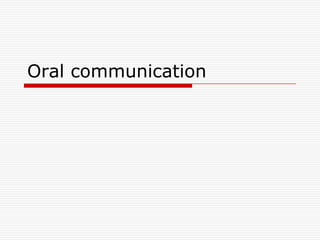
Oral communication
- 2. MEANING Oral communication implies communication through mouth. It includes individuals conversing with each other, be it direct conversation or telephonic conversation. Speeches, presentations, discussions are all forms of oral communication. Oral communication is generally recommended when the communication matter is of temporary kind or where a direct interaction is required. Face to face communication (meetings, lectures, conferences, interviews, etc.) is significant so as to build a rapport and trust.
- 3. Advantages of Oral Communication There is high level of understanding and transparency in oral communication as it is interpersonal. There is no element of rigidity in oral communication. There is flexibility for allowing changes in the decisions previously taken. The feedback is spontaneous in case of oral communication. Thus, decisions can be made quickly without any delay. Oral communication is not only time saving, but it also saves upon money and efforts.
- 4. Advantages of Oral Communication Cont’d Oral communication is best in case of problem resolution. The conflicts, disputes and many issues/differences can be put to an end by talking them over. Oral communication is an essential for teamwork and group energy. Oral communication promotes a receptive and encouraging morale among organizational employees. Oral communication can be best used to transfer private and confidential information/matter.
- 5. Disadvantages/Limitations of Oral Communication Relying only on oral communication may not be sufficient as business communication is formal and very organized. Oral communication is less authentic than written communication as they are informal and not as organized as written communication. Oral communication is time-saving as far as daily interactions are concerned, but in case of meetings, long speeches consume lot of time and are unproductive at times. Oral communications are not easy to maintain and thus they are unsteady.
- 6. Disadvantages/Limitations of Oral Communication Cont’d There may be misunderstandings as the information is not complete and may lack essentials. It requires attentiveness and great receptivity on part of the receivers/audience. Oral communication (such as speeches) is not frequently used as legal records except in investigation work.
- 7. Oral Communication (unit-2) Oral Communication includes- Face to Face Conversation. Telephonic Conversation
- 8. Oral Communication includes- Lectures Speech Group discussion Social gatherings Interview Conference & Meeting
- 9. MERITS Facial expressions and gestures make communication effective It is the best medium for discussions as negotiation, interview, counseling etc. Communicator can get known the reaction of message on receiver through his gestures & expressions & tone
- 10. MERITS It provides immediate feedback. It save time & efforts. Listener can get immediate clarification of any doubt in his mind.
- 11. LIMITATION- It is not possible while dealing a large group. It is ineffective when listener is not attentive and different perceptions It can not retain for longer time as permanent record. It is less effective if communicator has no convict on himself
- 12. Merits of Telephonic Conversation- Interact freely on Phone. It eliminates the barriers between physically disposed persons. We can get immediate / quick feed back. At a time we can talk one person effectively Long discussions are not possible Expensive and less effective
- 13. LIMITATION- Technical problem distract telephone network if device is not working well In case of mobile phone signal problem become barrier to communication Ring tone disturb others anytime any where even is classroom, meetings, silence zone, conferences etc
- 14. Principles of Successful Oral Communication Clarity of expression Make communication a two-way process Develop trust by creating listeners interest Be precise, avoid hackneyed Avoid communication overload, easy flow Overcoming barriers (time, distance & noise) Timely feedback
- 15. Communication & Listening Skills Correct choice of medium Strong conviction Sequence, coherence and consistency in contents Economical, Accurate, Empathetic Identify barriers & try to rectify the problem Go for appropriate body language
- 16. IMPORTANCE OF FEEDBACK INPUTS SENDER FEEDBACK RECEIVER Factors Affecting: Factors Affecting: •Sender / Transmitter ( Sx ) Receiver ( Rx ) •Personality and Attitude Personality and Attitude •Cultural effect Cultural effect •Mental setup & Psychology Mental setup & Psychology •Experience & background Experience & background •Communication Skills Communication Skills •Knowledge & Qualification Knowledge & Qualification
- 17. Conversation Control The ability to control a conversation ensures that you can steer a conversation in a positive direction that meets your needs. Whether you are using your conversation control to lead a business discussion or a personal talk, employing control techniques will prevent the conversation from heading into areas you don't wish to discuss and help you to leave a positive impression.
- 18. Conversation Control Techniques Questioning Compliments Eye Contact Pauses
- 19. Nonverbal/ pictorial Communication Pictures Posters Banners Film clips Slides Gestures
- 20. Nonverbal/ pictorial Communication MERITS- It is very effective in use in silent zone It eliminates differential perceptions It is effective when emotions take place
- 21. Nonverbal/ pictorial Communication LIMITATION- It is ineffective particular for illiterate persons It is not possible in each and every situation It cannot be use for lengthy conversation
- 22. Non Verbal Communication It covers all external stimuli other than spoken or written words and including characteristics of appearance, voice and use of space and time. Kinesics- It is study of the role of body movements such as winking and shrugging in communication Proxemics-It is also called space language which subject the deals with the way people use physical space to communicate.
- 23. Non Verbal Communication Chronemics or Distance language-The subject that deals with the way people use time dimension or time language Paralanguage- The non verbal factors like tone of voice, the speed of delivery, the degree of loudness or softness, and the pitch of voice which affect the spoken words called paralanguage
